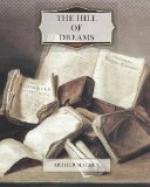in the department of the utterly contemptible; he
had vowed he would be the dunce of Cervantes’s
school rather than top-boy in the academy of A
Bad Un to Beat and Millicent’s Marriage.
And with this purpose he had devoted himself to laborious
and joyous years, so that however mean his capacity,
the pains should not be wanting. He tried now
to rouse himself from a growing misery by the recollection
of this high aim, but it all seemed hopeless vanity.
He looked out into the grey street, and it stood a
symbol of his life, chill and dreary and grey and
vexed with a horrible wind. There were the dull
inhabitants of the quarter going about their common
business; a man was crying “mackerel” in
a doleful voice, slowly passing up the street, and
staring into the white-curtained “parlors,”
searching for the face of a purchaser behind the India-rubble
plants, stuffed birds, and piles of gaudy gilt books
that adorned the windows. One of the blistered
doors over the way banged, and a woman came scurrying
out on some errand, and the garden gate shrieked two
melancholy notes as she opened it and let it swing
back after her. The little patches called gardens
were mostly untilled, uncared for, squares of slimy
moss, dotted with clumps of coarse ugly grass, but
here and there were the blackened and rotting remains
of sunflowers and marigolds. And beyond, he knew,
stretched the labyrinth of streets more or less squalid,
but all grey and dull, and behind were the mud pits
and the steaming heaps of yellowish bricks, and to
the north was a great wide cold waste, treeless, desolate,
swept by bitter wind. It was all like his own
life, he said again to himself, a maze of unprofitable
dreariness and desolation, and his mind grew as black
and hopeless as the winter sky. The morning went
thus dismally till twelve o’clock, and he put
on his hat and great-coat. He always went out
for an hour every day between twelve and one; the
exercise was a necessity, and the landlady made his
bed in the interval. The wind blew the smoke from
the chimneys into his face as he shut the door, and
with the acrid smoke came the prevailing odor of the
street, a blend of cabbage-water and burnt bones and
the faint sickly vapor from the brickfields. Lucian
walked mechanically for the hour, going eastward, along
the main road. The wind pierced him, and the
dust was blinding, and the dreariness of the street
increased his misery. The row of common shops,
full of common things, the blatant public-houses,
the Independent chapel, a horrible stucco parody of
a Greek temple with a facade of hideous columns that
was a nightmare, villas like smug Pharisees, shops
again, a church in cheap Gothic, an old garden blasted
and riven by the builder, these were the pictures
of the way. When he got home again he flung himself
on the bed, and lay there stupidly till sheer hunger
roused him. He ate a hunch of bread and drank
some water, and began to pace up and down the room,
wondering whether there were no escape from despair.
Writing seemed quite impossible, and hardly knowing
what he did he opened his bureau and took out a book
from the shelves. As his eyes fell on the page
the air grew dark and heavy as night, and the wind
wailed suddenly, loudly, terribly.




